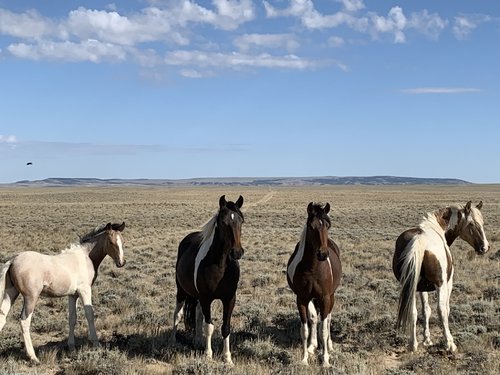I recently had a conversation with a couple of politicians about this and thought before I spoke to them again, I would ask the ladies and gentlemen of this forum for their thoughts.
For those who dont follow this or perhaps are not aware of the problem, please let me give you a very brief summary.
There are approx 100000 wild horses and burros grazing on BLM land throughout 10 states ( approx half in Neveda ). Another 50000 are being held and fed by the Govt. ( which means you, via your tax dollars ) in an "adoption" program.
It is estimated that along with feeding the other wildlife that are feeding on the BLM land, the "land" could support approx 27000 wild horses and burros ---plus another 3000 in the adoption program ( which is what is estimated to be the number of horses adopted each year ) BTW, currently we are giving each person who adopts one of these animals 1000 dollars to help care for it.
I know few will remember this, but during World War II, horse meat was being served on a lot of dinner tables across America, but after the war those who were against eating horse meat, labeled Harry Truman, "Horse Meat Harry" and horse meat disappeared from the dinner tables across most of America. Again in the 70's horse meat returned to some markets, but the stores selling horse meat were "surrounded" by people riding horse's and carrying signs and horse meat once again disappeared from most dinner tables across America.
It should be noted that citizens in many other countries around the world still sell and eat horse meat.
How do you ladies and gentlemen feel about reducing the herds by creating a horse meat market similar to our existing beef market---AND---do you think it is possible ? And if not, what is your solution for reducing the herd size on BLM land to a sustainable size ?
For full disclosure I am not a fan of Mr. Perry who is the one spearheading ways to "manage" the wild horses and burros on BLM land, but in all fairness the problem existed way before he became involved.
I feel some sort of drastic ( however unpopular ) action needs to happen, other than just throwing more money at it via the long term plan of reducing the herd size by removing the ovaries in the mares until they reduce themselves from natural causes ( old age ) with no new births.
Your thoughts please ?
For those who dont follow this or perhaps are not aware of the problem, please let me give you a very brief summary.
There are approx 100000 wild horses and burros grazing on BLM land throughout 10 states ( approx half in Neveda ). Another 50000 are being held and fed by the Govt. ( which means you, via your tax dollars ) in an "adoption" program.
It is estimated that along with feeding the other wildlife that are feeding on the BLM land, the "land" could support approx 27000 wild horses and burros ---plus another 3000 in the adoption program ( which is what is estimated to be the number of horses adopted each year ) BTW, currently we are giving each person who adopts one of these animals 1000 dollars to help care for it.
I know few will remember this, but during World War II, horse meat was being served on a lot of dinner tables across America, but after the war those who were against eating horse meat, labeled Harry Truman, "Horse Meat Harry" and horse meat disappeared from the dinner tables across most of America. Again in the 70's horse meat returned to some markets, but the stores selling horse meat were "surrounded" by people riding horse's and carrying signs and horse meat once again disappeared from most dinner tables across America.
It should be noted that citizens in many other countries around the world still sell and eat horse meat.
How do you ladies and gentlemen feel about reducing the herds by creating a horse meat market similar to our existing beef market---AND---do you think it is possible ? And if not, what is your solution for reducing the herd size on BLM land to a sustainable size ?
For full disclosure I am not a fan of Mr. Perry who is the one spearheading ways to "manage" the wild horses and burros on BLM land, but in all fairness the problem existed way before he became involved.
I feel some sort of drastic ( however unpopular ) action needs to happen, other than just throwing more money at it via the long term plan of reducing the herd size by removing the ovaries in the mares until they reduce themselves from natural causes ( old age ) with no new births.
Your thoughts please ?





